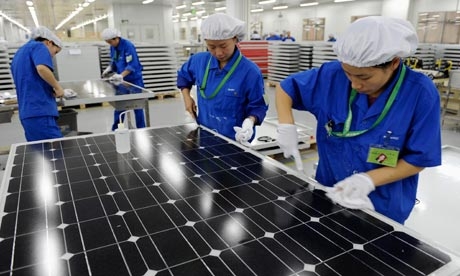China is all set to become the world’s biggest solar market over this year, but it appears the Chinese market is undergoing heavy restructuring as state subsidies are being directed toward smaller projects rather than large-scale ones in an effort to encourage new facility developments in areas with chronic power shortage issues.
As Bloomberg reports, Meng Xiangan, vice-chairman of the China Renewable Energy Society, commented that under the new policy, one-time initiatives could vanish. But a power production-based subsidy could now include low-voltage plants that do not usually supply utilities.
This means China’s Golden Sun program would see a contraction even as China keeps urging solar developers to install ever more photovoltaic devices—more than any other country. That isn’t good news for these manufacturers, who are already facing tough times.
Suntech Power Holdings Co. (NYSE: STP) is just one example; it was the world’s largest solar panel manufacturer as of 2011, but it is now unprofitable, had stopped making bond payments as of last week, and today filed for bankruptcy.
 Source: The Guardian
Source: The Guardian
In short, the worldwide consolidation of the solar market is hitting China, and it won’t be pretty.
Bloomberg reports:
“The wave of solar industry consolidation that’s hit Europe and the U.S. is coming to China,” said Nathanael Greene, director of renewable energy policy at the Natural Resources Defense Council in New York. “China’s manufacturers are counting on domestic market growth this year, so major cuts in incentives could really hurt.”
Various developers, numbering in the hundreds, saw demand for their solar tech drop sharply across Europe and the U.S. last year. The Chinese government has accordingly chosen a long list of developers to receive subsidies in an effort to prop up the solar sector, Bloomberg reports.
The problem here is that solar developers in China have received inflated subsidies and are simply not used to having to compete for efficiencies and market dominance. They have little incentive to actually develop high-efficiency products, since the subsidies have kept them afloat. Now that China says it will curb these subsidies, it spells trouble for the Chinese solar sector.
In fact, despite the subsidies (which began in 2009), Chinese PV makers have seen their profit margins vanish after the sector built too much factory capacity over the past two years, Bloomberg reports. And we’re talking about a $75 billion solar-components industry here.
As of March 18, Suntech was in the red to the tune of $541 million in bonds. Meanwhile, LDK Solar Co.’s (NYSE: LDK) ADRs dropped 11 percent. In contrast, Canadian Solar Inc. (NASDAQ: CSIQ), which has based its manufacturing in China, saw its shares go up 1.8 percent.
As of 2012, China had 6.5 GW of total solar installed capacity. Over this year, another 6.2 GW are expected to be put in place, Bloomberg reports, which would allow China to overtake Germany as the largest solar market in the world. That includes programs that have been delayed or even shelved due to various project quality and connection issues.
Our analysts have traveled the world over, dedicated to finding the best and most profitable investments in the global energy markets. All you have to do to join our Energy and Capital investment community is sign up for the daily newsletter below.
But rather than continue its one-time-incentive program, China is actively seeking to move to a kilowatt-hour-based incentive, which would promote competition and provide a longer-term basis of support to the rapidly shrinking market.
The new subsidies would be in the form of 0.35 yuan per kilowatt-hour for distributed solar-power projects, with less than 6 MW capacity. China’s main goal is to continue providing some sort of incentive until solar power becomes about as costly as obtaining power from coal-fired plants.
Meanwhile, as the Guardian notes, Suntech’s woes are a rather large problem for the Chinese solar market. After all, the Chinese government had made Suntech sort of a poster child for the Chinese solar revolution. Now its defaults include debts owed both to the International Finance Corp. and Chinese lenders.
The Guardian quotes David King, Suntech’s CEO:
“It is currently a very difficult time for our company and our industry, but the management and board of Suntech are committed to finding a way forward that will take into account the rights and interests of all of its constituents, including shareholders, note holders, lenders, customers, suppliers and employees,” King said.
It doesn’t help that last July, it turned out one of its business partners had faked $680 million in collateral for a loan that Suntech had guaranteed, as the Guardian reports.
Overall, Suntech’s shares have fallen nearly 80 percent in the past year.
What’s ironic is that the Chinese government’s subsidies created the production glut in the first place despite weak demand.
If you liked this article, you may also enjoy:



